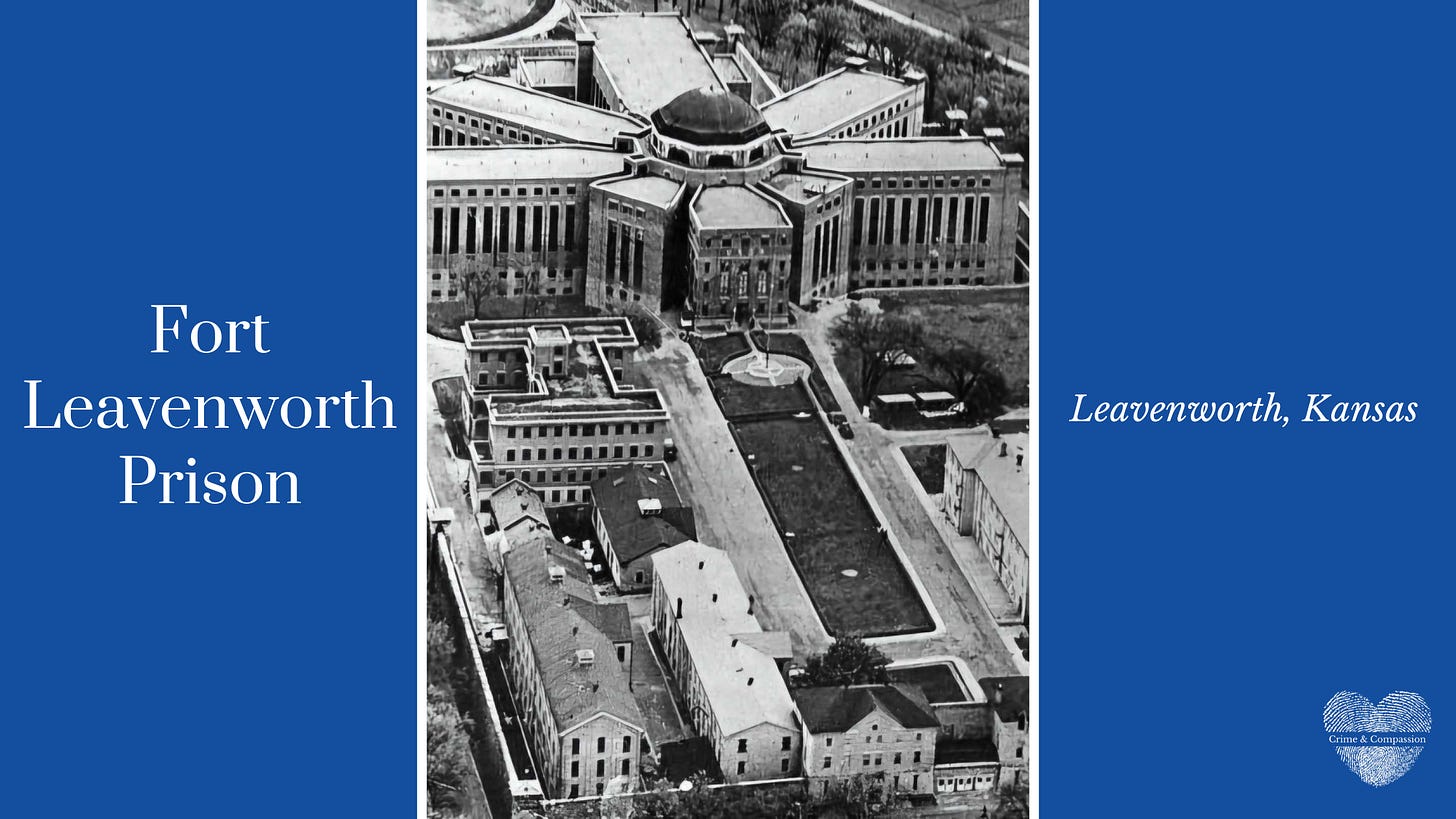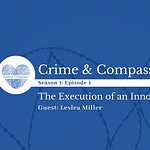Can someone really find true freedom inside the walls of a notorious prison?
In 1987, David Mike swore allegiance to his country and joined the army—a goal he had worked toward since he was a teenager. His dream quickly slipped through his fingers once ecstasy was placed in his palm. Before he knew it, David was the prime seller of ecstasy on his army base. The army’s criminal division arrested him in 1989, and by 1990, he had landed at Fort Leavenworth—an infamous military prison in Kansas. The final nail in the coffin? David was dishonorably discharged for desertion.
His memoir, Dishonor: One Soldier’s Journey from Desertion to Redemption, details David’s journey as a new inmate at Fort Leavenworth. I met David at a conference in 2016 and had the privilege of helping him with his book. Now his book is read in dozens of prisons throughout the US, including the very one where I volunteer: Mabel Bassett Correctional in McLoud, Oklahoma. (Small world.)
Today, you’re going to learn how David found freedom in a dark, dark place.
Prologue: Oh No, What Have I Done?
29 October, 1989
Alexandria, Louisiana
VANN PUSHED HIS way through the frenzied nightclub crowd wearing a look of deliberate intent. Determined steps brought him right up in my face with apparent desperation in his tone. “Dude . . . I heard some cops talking in the parking lot! They mentioned your name saying they’re coming in here to get you!” he exclaimed.
Oh, the irony. I knew this day would come sooner or later. I even played it out in my mind. “If I ever get caught, I’ll pop everything I have on me and go out in a blaze of glory!” I boastfully remarked. Nothing goes as planned, though. I uncharacteristically spent the previous day meticulously slipping one hundred ecstasy pills, one by one, into one-inch plastic Ziploc baggies normally used for LSD. Slowly and gently, I cataloged the small, white bits of escapism, making it impossible to overdose. This single random act saved my life, having no idea that the next day I would be arrested. I did, however, manage to take a few pills before I got to the club.
Two burly sheriffs entered from both sides of the nightclub in synchronous rhythm, eliminating any visible exit for me. One of them grabbed my arm as I simultaneously dropped my jacket containing all of my drugs on the crowded dance floor. Swiftly they escorted me through the teeming masses and outside into the parking lot, slamming my wiry frame up against the wall. “DON’T . . . MOVE!” bellowed a third officer, pointing his sleek gun barrel toward my head. “Let’s see what you’ve got on you.”
They searched me, digging into my pockets and patting down every inch of my clothing. They managed to scrape together the ten cents I carried in my pockets and grew furious as their search became more intense. After all, they were tipped off to what was supposed to be a legitimate drug bust. Funny how they never noticed me dropping my jacket on the dance floor. Thankfully, this could have been worse. Even though I deserved it, I have to say I am glad they never found it.
“Get in the car!” demanded the other officer. The click of the handcuffs on my wrists signaled they were locked down tight. I was shoved into the car and at that point, all guns were holstered. As the metal door clamped shut, I realized this was for real. My fate was cinched.
There’s no getting out of this one. All the running, the drugs, and my freedom was over. Stupidity and bad choices paved a dark path to this bite of reality. I was in jail, my head still numb from the ecstasy I took shortly before being apprehended.
The Louisiana State Police interrogated me as my wrists grew sore from the handcuffs that were still clamped on, and my arms aching from being wrapped around the back of the stiff, uncomfortable chair. I endured several smacks in the head because I was either smart-mouthing the officers or not divulging what they wanted to hear. On and on the lecturing rambled.
“We don’t need you in our city, what with all the illegal drugs you’ve been slinging around! Your kind pollutes this fine community.”
I don’t remember much about what happened during processing. Soon, I found myself in what would become my living quarters for the evening. As I lay on the cold, steel bed in the dark, somber cell, I knew that the “God, if you could just get me out of this” prayer was not going to work.
At nineteen years old, I had seriously screwed up. My life was a complete mess. I cried a little bit. Thoughts of my family, who were still living in Germany at the time, filtered into my foggy mind. My parents were probably going to be relieved I was finally caught. At least they would finally know my whereabouts. Up until tonight, I could never really tell them. My father was in the US Air Force and if he knew my whereabouts, he would have to turn me in or be charged with aiding and abetting a military fugitive.
I was AWOL.
Six months prior to this night, I decided to run away from the army. I believe God was with me, but I was not with God.
What was going to happen to me?
Oh no, what have I done?
Chapter 1: Soldier
“The only thing I ever wanted to be when I grew up was a soldier. After watching my first Indiana Jones movie, I briefly shifted my attention toward archaeology. When I mentioned this to my peers and some of my teachers, their reply was that looking for bones in the desert would be boring, so I resumed my path in life and directed my steps toward the army.
I grew up as an air force brat. . . . My aspirations of being a soldier inspired me to do the necessary things to ensure this dream would come true. During my freshman and sophomore year of high school, I joined the Marine Corps Junior Reserve Officer Training Corps. It was such an ego boost to an introverted four-foot, eight-inch-tall ninth grader weighing eighty-five pounds.
You could say I was a ‘Highly motivated, truly dedicated JROTC Cadet, sir!’”1
United States vs. Private E-2 David C. Mike
From the official transcript of the 1989 trial — David’s statement to Judge Grainger:
David Mike: I realize the charges against me are serious, and I know that I’m guilty of these crimes. I have a drug problem, a problem that has changed me into a person I’m ashamed of. My addiction took away my better judgment to control my life. I have disgraced myself, my family, the United States Army, and God. I only wish I could go back and change the things I’ve done. I know that’s impossible, so I’m ready to accept my punishment and move on to becoming a rehabilitated member of society. I have nothing but time ahead of me to start over, change my ways, and regain the respect that I’ve lost.2
“As I read this [statement to the judge], I shake my head at my own self.
How did it ever get to this?
Why did I make these decisions?
Who was this person?
I am so very thankful for a God who says, “Stop running, come home, you are forgiven.”
Even after all I have done—addiction, shame, disgrace—God doesn’t see it.”3
The Notorious Leavenworth
“As we pulled up to the almost ninety-year-old USDB, I noticed the massive brick walls that surrounded the compound. They were very tall, anywhere from sixteen to forty-one feet depending on the terrain, topped with razor wire and towers manned with military guards armed with rifles. Visible above the walls was an even larger structure. It had a domed central building with long wings jutting out of it like spokes on a wheel that were about nine stories tall. This served as the main housing unit for most of the fifteen hundred inmates that resided inside the walls.
It was an imposing sight. It was called the DB or sometimes the Castle.
Once inside, a couple of guards jumped in my face and started dressing me down. It felt like basic training all over again.
‘You really screwed up coming here. What are you in here for?’ the guards barked.
‘Drugs and AWOL, sir!’ I replied.
One of the guards inquired, ‘Didn’t you hear Nancy Reagan when she said, “Just say no”?’
They did not find any contraband or weapons, so I was told to grab my duffle bag. As I did, the Bible my parents sent me fell out and landed on the ground.
One of the guards mumbled, ‘You’re going to need that in here.’”4
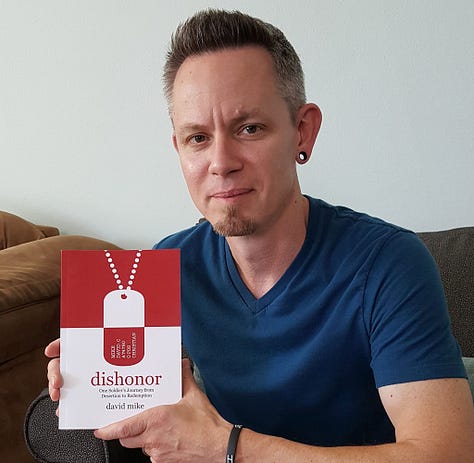
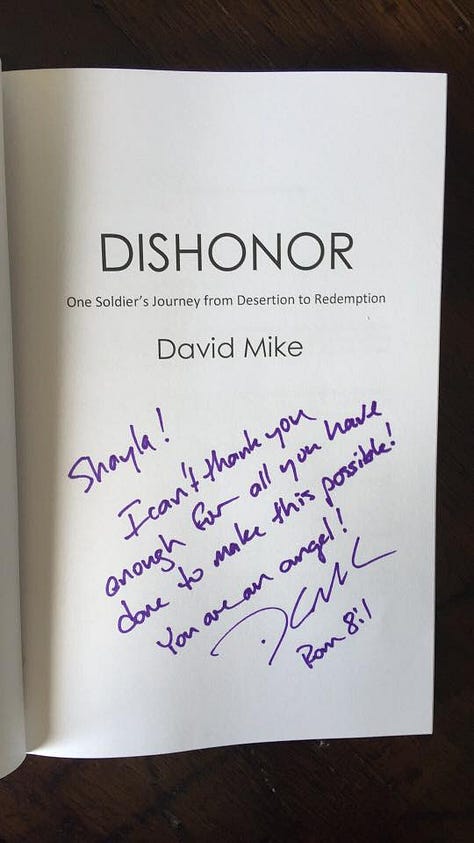


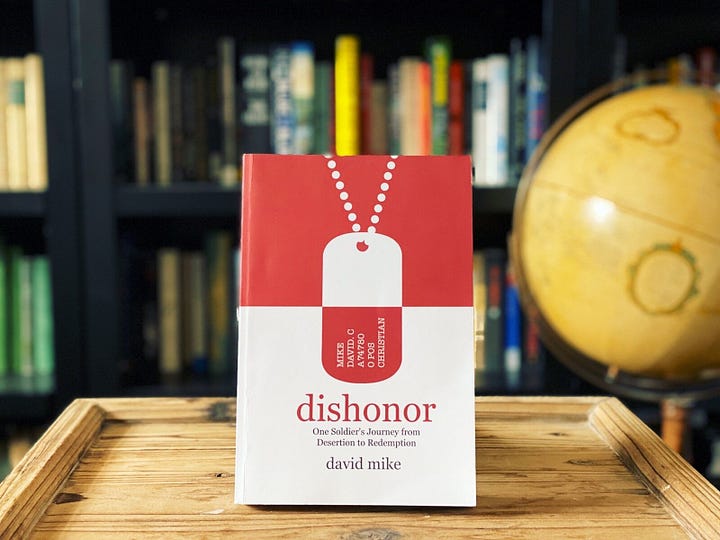
Meeting & Working with David Mike
Jon Acuff, author of several personal transformation books, is the link between David and me. In 2014, Acuff’s readers got together and created the Launch Out Conference, which brought creatives and entrepreneurs together under one roof. During the second annual conference, I learned about a man named David Mike. He had blogged his book! In our venue in Nashville, Tennessee, I shook David’s hand for the very first time. He was humble and kind and polite.
And he wanted to launch his memoir! I was floored that he wanted my help.
Working with David inspired an instant friendship, and I will never forget how much his story affected me. It would be about three more years before I’d start working with the incarcerated, but the seed had already been planted.
It’s no secret that David’s memoir has been in the hands of countless inmates, including those at Mabel Bassett women’s prison. In fact, the RISE Program (founded by Christie Luther) provides David’s book to each graduating cosmetology student as a gift. I’ve been blessed to meet some of the women in the RISE Program, including Christie. Small, small world indeed!
I am so grateful for men like David Mike who prove that God can use any story.
Send David’s Book to a Prison
Will you please consider grabbing a copy of David’s memoir? It is such a touching story! You will not regret reading it.
You can also reach out to David at dilemmamike@gmail.com if you want to have Dishonor sent to a prison.
David Mike is a Christ follower, husband, father, author, and cosmetology instructor in Omaha, Nebraska. David is passionate about sharing the message that we do not have to be defined by our past and that God can use our kind of mess for good. He is the author of Dishonor: One Soldier’s Journey from Desertion to Redemption.
Crime & Compassion strives to shake up how we view and treat the incarcerated. Podcast host Shayla Hale asks difficult questions to gain a more compassionate understanding of those who were written off. The podcast serves as a safe space for the formerly incarcerated, currently incarcerated, their families and loved ones, and those who work with men and women in US jails and prisons. Crime & Compassion’s goals are 1) to show love and kindness toward the captives, 2) to help bring their stories and art into the world, 3) to completely flip the narrative on the US justice system by having tough conversations, 4) to educate society on why people commit the crimes they do, and 5) to reframe how people see, treat, and think about the incarcerated.
David Mike, Dishonor: One Soldier’s Journey from Desertion to Redemption (Dilemma Mike Publishing, 2016), “Chapter 1: Soldier.”






